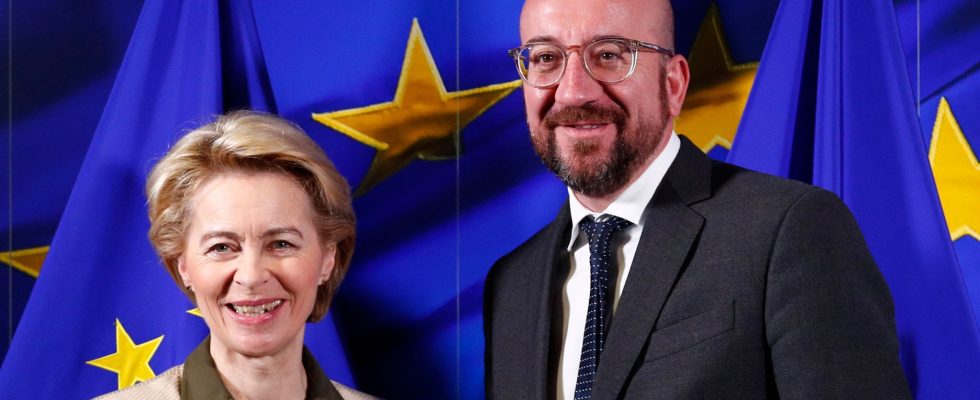The Oval Office for him, the White House garden for her. During the United States-European Union summit on October 23, in Washington, the President of the European Council and the President of the Commission were each entitled to their privileged – and immortalized – moment with the American President. The images have toured the chancelleries of the Old Continent. “Joe Biden welcomes the peace talks between Charles Michel and Ursula von der Leyen,” an observer mockingly scolds. In Brussels, diplomats are now openly exasperated by the rivalry between the two heads of the community institutions. “It’s pathetic, it makes me desperate,” whispers one of them; “totally dysfunctional,” says another; “the way they work together worries the capitals,” summarizes a third source.
Since the “sofagate” alert two and a half years ago (von der Leyen found herself on a sofa in the Turkish presidency, while Erdogan and Michel sat on the two available armchairs), he has not there has never been reconciliation or even peace of the brave. At the beginning of October, the visit of the President of the European Commission to the Macronist campus in Bordeaux gave the organizers a cold sweat. “She threatened not to come if Charles Michel was also invited,” says a French source. “At the same time, he would have been annoyed, because he is a member of the centrist political family and she is not.” Another recent example: after the joint tribute to the Israeli victims of the Hamas massacres, Charles Michel’s entourage was choked up when they discovered that their leader had disappeared from the photo published on the “X” account of his nemesis.
These anecdotes could make you smile if the international context was not so dark. However, it is in the field of foreign policy that the rivalry is most visible and most damaging. From this point of view, Ursula von der Leyen’s trip to Israel undoubtedly marks a turning point. Her desire to be the first there was displeasing. “It’s the straw that breaks the camel’s back,” deciphers a well-placed source. Especially since on October 13, the former German Minister of Defense assured Benjamin Netanyahu of European support, without mentioning the necessary respect for international law, a position adopted by the Twenty-Seven. This time, even Josep Borrell, the head of European diplomacy, publicly stood out. “It happens that we discover certain announcements or certain trips in the press,” laments a foreign relations expert. The President of the Commission likes to be in charge. Concluding an agreement on migration with Tunisia, without formally consulting the member states of which Charles Michel is the spokesperson, does not scare him. It also displays its proximity to the United States, in particular by adopting a tough posture towards China.
“With her, the discussions are rather a posteriori, instead of being a priori,” we regret in Paris. “She had her straps lifted by the Twenty-Seven,” we were told on the sidelines of the summit of European leaders in Brussels, on October 26 and 27. To remind the impudent that it is the heads of state and government who really hold the power in the EU, the instruction was given to suggest other names for his succession, while a second mandate seemed until now. ‘here rather acquired.
The texts of the European treaties expressly entrust responsibility for the external representation of the Union and foreign policy to the President of the European Council and the High Representative. In reality, it’s more complicated. “The last treaty is 20 years old. However, because of Covid, China, the war in Ukraine, we need new instruments which no longer fall within the classic field of foreign policy, but rather within the field of action of the Commission, tempers an ambassador of a Member State. It is inevitable that the Commission engages in geopolitics, we asked it to do so.” Let us add that with its 40,000 civil servants, the institution weighs significantly more than the presidency of the European Council, which can only rely on a few dozen people.
What if ultimately, the individual quarrel was only the emerging part of a deeper problem? Jealous of their prerogatives, the Twenty-Seven do not want a single and powerful president for the Union. However, the multiple crises require rapid decisions to be effective and more and more major decisions are being taken on a European scale. In their own way, Charles Michel and Ursula von der Leyen each try to step into the breach to embody a power in the making. Without institutional clarification, their successors also risk continuing to elbow each other.
